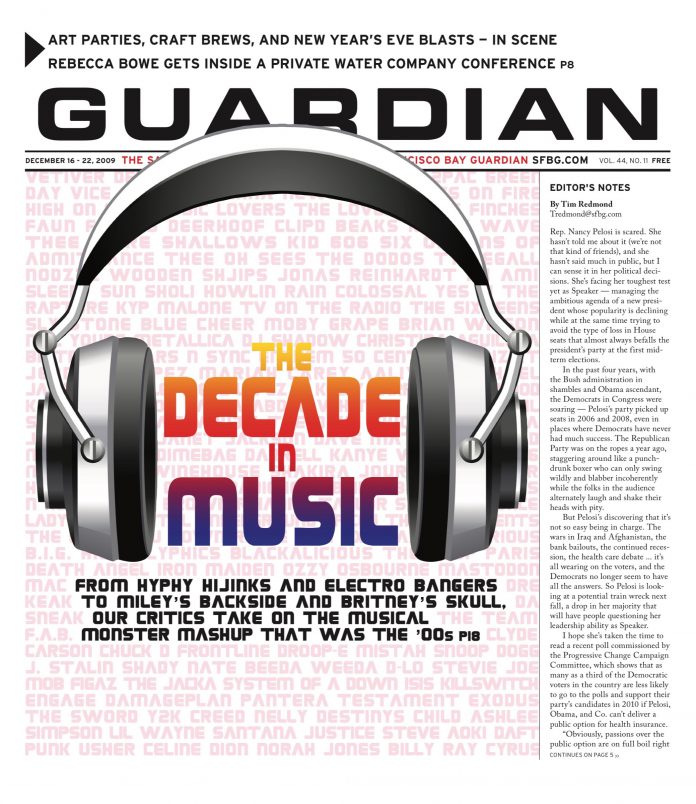
Guardian illustration of the Jonas Brothers by Matt Furie and Aiyana Udesen
DECADE IN MUSIC Forget what you’ve heard: stars aren’t born — they’re made. Pop music over the past decade has been defined by the music industry, with standout stars manufactured to be, well, standout stars. We’ve reached the point where the biggest names are chosen by reality TV, the media, and, more often than not, the Disney corporation.
Does that sound cynical? The past 10 years have by no means represented a dearth of good pop music. But it’s impossible to reflect on them without acknowledging the massive influence of American Idol, a show that emphasizes and glorifies the artificial production of pop stars. Sure, it’s found plenty of legitimate talent (try to avoid Carrie Underwood), but that doesn’t downplay its role as an assembly-line for fame.
We came into this millennium with boy bands facing their inevitable, and long overdue, decline. The Backstreet Boys went on hiatus in 2002, but let’s face it, that was more of a formality than anything else. (Remember 2000’s Black and Blue [Jive]? Yeah, me neither.) Something had to fill that void. How convenient, then, that American Idol debuted in June 2002.
"This is American Idol," Ryan Seacrest emphatically declares at the start of each episode. On the surface, the show is about letting America choose: winners are selected by texted and phoned-in votes. But the contestants are shamelessly molded by the judges and producers, told how to dress, how to act, and — of course — what to sing. I’m sure this isn’t much different from what has always gone on behind the scenes, but American Idol was the first program to show us just how inauthentic pop music can be, and to add a false veneer of democracy to the package.
There have been several success stories, depending on how you define success. First season winner Kelly Clarkson continues to maintain a thriving career, though much of that has involved a process of reinvention. Former contestant Jennifer Hudson won an Oscar for Dreamgirls, but only after she’d sufficiently distanced herself from the show. (Ask producer Simon Cowell how he feels about that.) Finally, there’s the most recent runner-up Adam Lambert, the queer alternative to squeaky-clean winner Kris Allen.
As a launching off point, American Idol offers unparalleled opportunities. But to make the more lasting pop impression, singers have to find their own niche and, in their own way, rebel. It’s comforting to know there’s still room for self-expression. The machine continues to pump out idols, but the occasional burst of creativity manages to find its way through.
At least, to some extent. It’s hard to stay optimistic about the future of the genre when one of the biggest pop stars of last year, Taylor Swift, epitomizes the mundane. Bubbly and fun but nothing special, her "country" crossover appeal is simply an affected twang. And her success? Thanks to Kanye West’s interruption of her acceptance speech at MTV’s Video Music Awards, Swift found herself cast as a victim by the media. Were those tears in her eyes when Kanye stole the mic, or was that twinkle the knowledge of how far his faux pas would take her?
Meanwhile, Disney continues to promote its own brand of actor-singers. The tradition is nothing new. Let’s not forget that Britney Spears and Christina Aguilera, big from the start of the decade, are former Mouseketeers. It’s clear that the Jonas Brothers and Miley Cyrus have talent — whether or not you like their music — but there’s something disingenuous about their wholesome personas. (Let’s not forget Miley’s controversial photo shoot. She has a bare backside, you guys!) Purity rings aside, they’re as much industry creations as anyone American Idol has spit out.
Perhaps I’m being naïve. The music industry’s role in pop music is a longstanding tradition, but never before has the mechanization been more obvious, or aimed at a younger audience. My hope, then, is for a decade full of mold-breakers like Lady Gaga, whose freak act may not be new but is still more exciting than most anything else out there. And as for those mom-approved wax figures? Let’s just wish they make like Icarus and fly too close to the sun.

